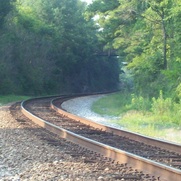
The drive between Alberta's two main cities, Calgary and Edmonton, takes a little over three hours according to MapQuest. A high-speed rail link could get people from one downtown to the other in just 84 minutes, less than half the time. Would it be worth it to taxpayers for the government to build such a rail line? It's hard to say. Some would surely be thrilled, while others wouldn't care. Thanks to a company called Alberta High-Speed Rail, though, provincial legislators might not have to make that judgment call.
Company chairman Jack Crawford told a legislative committee yesterday that the line could be built for under $4 billion and financed entirely with private funds. The committee had previously heard that it could cost up to $20 billion, and that it wasn't feasible given the province's current population. But using the provincial government's own ridership study and a one-way fare of about $100, Crawford thinks the line would be profitable.
Personally, I love trains, bullet or otherwise. I have fond memories of trips to the Gaspé Peninsula with my mom as a child, and of backpacking through Europe on a Eurail Pass the summer after graduating from high school. I also enjoy the express from downtown Montreal to downtown Toronto which, though not a bullet train, is pretty fast and convenient.
Trains might still be a bigger part of our lives were it not for massive indirect subsidies to the trucking industry, which is responsible for "[v]irtually 100 percent of roadbed damage to highways" yet pays for only a portion of this through fuel taxes, according to Kevin Carson, senior fellow of the Center for a Stateless Society. Of course, railroads themselves, especially the ones that opened up the continent in the United States and Canada, were the beneficiaries of huge transportation subsidies, which Carson says "have probably done more than any other factor (with the possible exception of intellectual property law) to determine the present shape of the American corporate economy." Economies of scale are one thing, but these subsidies "make large corporations operating over wide market areas artificially competitive against smaller firms producing for local markets."
And indeed, even this proposed privately-funded bullet train line between Calgary and Edmonton is dependent on the government setting up "the regulatory framework for the acquisition of the right-of-way," which amounts to an implicit subsidy. But it at least sounds like a step in the right direction, with users of the high-speed train at least covering the lion's share of its costs.
Personally, I love trains, bullet or otherwise. I have fond memories of trips to the Gaspé Peninsula with my mom as a child, and of backpacking through Europe on a Eurail Pass the summer after graduating from high school. I also enjoy the express from downtown Montreal to downtown Toronto which, though not a bullet train, is pretty fast and convenient.
Trains might still be a bigger part of our lives were it not for massive indirect subsidies to the trucking industry, which is responsible for "[v]irtually 100 percent of roadbed damage to highways" yet pays for only a portion of this through fuel taxes, according to Kevin Carson, senior fellow of the Center for a Stateless Society. Of course, railroads themselves, especially the ones that opened up the continent in the United States and Canada, were the beneficiaries of huge transportation subsidies, which Carson says "have probably done more than any other factor (with the possible exception of intellectual property law) to determine the present shape of the American corporate economy." Economies of scale are one thing, but these subsidies "make large corporations operating over wide market areas artificially competitive against smaller firms producing for local markets."
And indeed, even this proposed privately-funded bullet train line between Calgary and Edmonton is dependent on the government setting up "the regulatory framework for the acquisition of the right-of-way," which amounts to an implicit subsidy. But it at least sounds like a step in the right direction, with users of the high-speed train at least covering the lion's share of its costs.